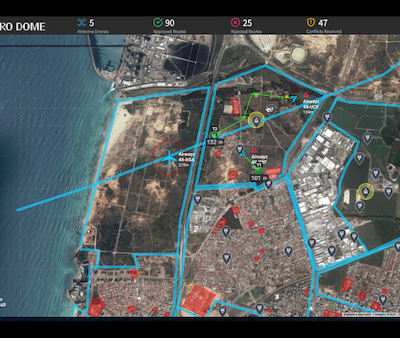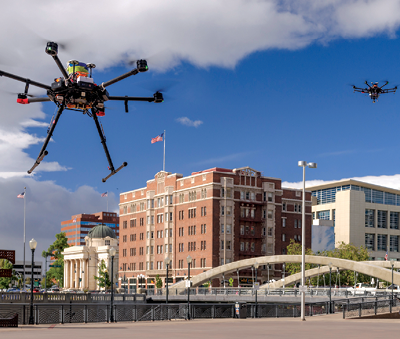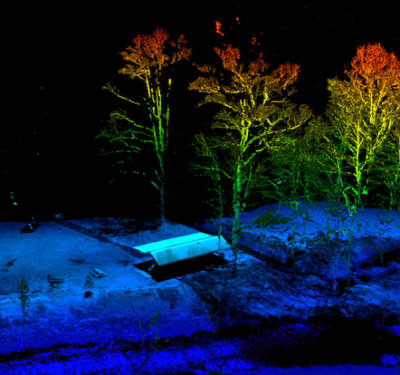Numbers don’t lie: bureaucratic inefficiency is stalling America’s leadership in advanced aviation.
The latest data from AUVSI’s Business Intelligence tool reveals a growing disconnect between industry demand and outdated regulatory processes – one that is slowing innovation, costing businesses time and money, and straining government resources.
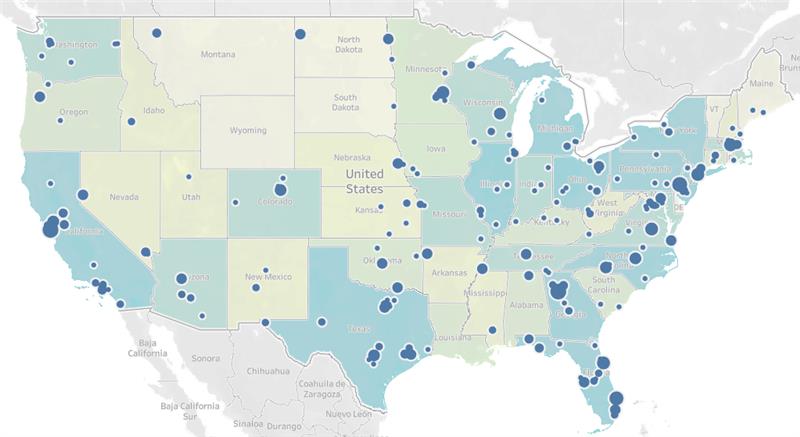
An analysis of FAA waiver approvals shows that a system meant to be temporary has become an unsustainable bottleneck for the industry.
In 2024, the FAA approved 809 Part 107 waivers, a staggering 256% increase over the previous year. Of those, 203 waivers, or 25%, were for Beyond Visual Line of Sight (BVLOS) operations. AUVSI commends the FAA for taking proactive steps to enable BVLOS operations through risk- based waivers while awaiting a final rule.
These approvals have allowed drone operators to expand their capabilities, execute more advanced operations, and demonstrate the safety and utility of BVLOS technology in real-world applications. By issuing these waivers, the FAA has supported innovation and industry growth, ensuring that drone technology continues to advance even as regulatory frameworks lag behind.
However, while this surge in waivers reflects growing demand and an improved estimated approval rate (from 9% in 2023 to 19% in 2024), it also underscores a fundamental issue: waivers were never meant to be a long-term solution. By now, industry had expected a well- defined BVLOS rule to be in place – one that would provide clarity, consistency and a standardized framework for operators. Instead, we still rely on this patchwork of temporary approvals, operating BVLOS by waiver.
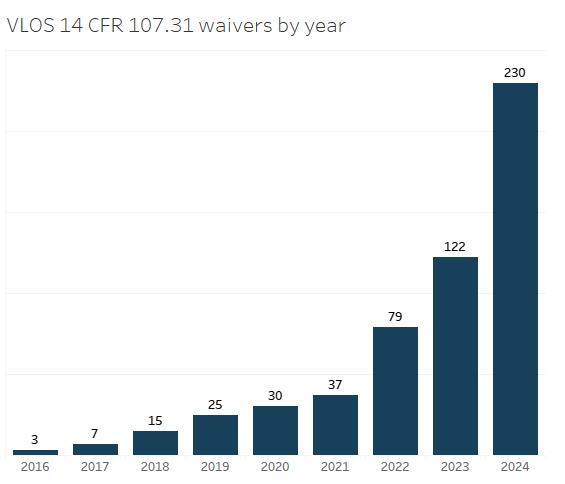
The consequences of this delay are clear. In 2024, the FAA had to review and approve more than 200 individual BVLOS applications – a very time and labor-intensive process for government and for industry. Rather than continuing to process hundreds of waivers one by one, the FAA has an opportunity to replace this fragmented system with a single, comprehensive BVLOS rule. The FAA’s forced reliance on waivers as a stand-in for rulemaking is not just inefficient, it is actively suppressing innovation and economic growth.
BVLOS operations are no longer niche – they are an economic imperative. There are now active BVLOS waivers in 46 states, spanning 39 industries, including:
- Public Safety & Emergency Response – Deploying drones immediately to disaster areas for search-and-rescue and damage assessment.
- Agriculture – Enabling more precise crop monitoring and reducing input costs.
- Energy & Infrastructure – Improving the efficiency and safety of power line and pipelineinspections.
- Logistics & Delivery – Unlocking new efficiencies for delivery and supply chain management in both urban and rural areas.
With every delay in BVLOS rulemaking, American businesses are forced to wait while international competitors race ahead. The U.S. should be leading the world in drone innovation, but bureaucratic inaction is keeping us grounded.
Moving the BVLOS enabling rule forward, as AUVSI wrote to the White House asking for in January, will reduce regulatory burdens and eliminate the need for redundant waiver applications and freeing up FAA resources. A rule to adhere to also provides much needed clarity and certainty for business, allowing for better planning and opportunities for investment and expansion. A BVLOS rule would also enhance safety ensuring operators follow a uniform, well- defined standard rather than an inconsistent patchwork of waivers.
The BVLOS rule is exactly the kind of regulatory reform the Trump administration has prioritized, requiring agencies to cut outdated rules instead of layering on more red tape. Advancing the BVLOS rule is an opportunity for the FAA to align with this policy – replacing hundreds of waivers with one clear, enabling framework.
The FAA has already missed a congressional deadline to move BVLOS rulemaking forward, and further delays threaten billions in economic growth. The industry has waited long enough. The time for action is now. The FAA must move BVLOS forward.
Michael Robbins is president and CEO at the Association for Uncrewed Vehicle Systems International (AUVSI), the world’s largest trade association for uncrewed systems, autonomy and robotics, in both the commercial and defense sectors. He joined AUVSI in 2020 and previously served as chief advocacy officer and an executive vice president.



